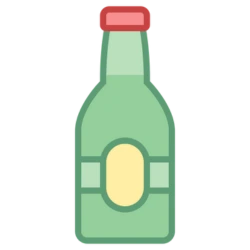Colorado has about 4.3 million people who are of drinking age [1]Park Street. “Colorado Alcoholic Beverage Market: Regulations, Statistics, Trends, and Wholesalers.” Accessed October 17, 2024.. If you want to sell alcohol in your bar or restaurant, you’ve got a lot of potential customers. But first, you’ll need a liquor license. In Colorado, aspiring liquor sellers must familiarize themselves with the different types of liquor licenses available.
This guide offers an overview of liquor licenses in Colorado, covering licenses for restaurants, bars, and retail stores. It outlines the necessary steps for obtaining and renewing these licenses, including details on associated costs and the application process. No matter the kind of alcohol you want to sell, this is your ultimate guide to getting a Colorado liquor license.
Types of Colorado Liquor Licenses
There are four different categories of liquor licenses, each having its own set of sub-licenses. They are as follows:
Manufacturer Licenses
- Malt Liquor Manufacturer License: Аllows breweries to produce beer in Colorado. Breweries holding this license can operate sales rooms where beer is sold to consumers.
- Wine Manufacturer License: Wineries can produce wine in Colorado under this license. They can also conduct tastings and sell their wine, as well as wine produced by other Colorado wineries, directly to customers on the licensed premises.
- Spirits Manufacturer License: Distilleries can produce spirits in Colorado with this license. Like wineries, they can conduct tastings and sell their spirits directly to customers on the licensed premises.
Nonresident Manufacturer and Importer Licenses
- Nonresident Malt Liquor Manufacturer License: For entities manufacturing beer outside of Colorado but importing and selling it to licensed malt liquor wholesalers in the state.
- Malt Liquor Importer License: Entities importing beer into Colorado can obtain this license to sell beer to licensed malt liquor wholesalers.
- Wine and Spirits Importer License: This license is for entities importing wine and/or spirits into Colorado and selling them to licensed wholesalers in the state.
Wholesaler Licenses
- Malt Liquor Wholesaler License: Allows wholesalers to distribute beer to licensed retailers within a designated area.
- Wine/Spirits Wholesaler License: Wholesalers holding this license can take orders for and sell wine and/or spirits at wholesale, operate warehouses, and package wine and spirits.
Retail Licenses
- Fermented Malt Beverage Retailer License: Establishments with this license can sell beer in sealed containers for off-premises consumption.
- Liquor-Licensed Drugstore License: Drugstores can sell beer, wine, and spirits with this license. They must derive a portion of their income from food sales.
- Retail Liquor Store License: Retail liquor stores with this license can sell malt liquor, wine, and spirits.

What type of liquor license do I need?

To determine the suitable liquor license for your business in Colorado, one must grasp the different types available. If your business involves production, you’ll need licenses tailored to your focus. Breweries seeking to produce beer within Colorado require a Malt Liquor Manufacturer License, enabling them to manufacture beer and operate sales rooms for direct consumer sales. Similarly, wineries require a Wine Manufacturer License, permitting wine production and direct sales to customers on-site. Distilleries wanting to produce spirits in Colorado must obtain a Spirits Manufacturer License.
Importing alcohol into Colorado necessitates the proper license, depending on the type of alcohol. For importing beer, a Malt Liquor Importer License is essential, while wine and/or spirits importation requires a Wine and Spirits Importer License. Distributing alcohol within the state requires wholesaler licenses. Wholesalers distributing beer need a Malt Liquor Wholesaler License, while those distributing wine and/or spirits must obtain a Wine/Spirits Wholesaler License.
If your business involves retail sales, your license choice depends on your sales model. For off-premises beer sales, a Fermented Malt Beverage Retailer License is required. Liquor-Licensed Drugstore License permits drugstores to sell beer, wine, and spirits, while Retail Liquor Store License is necessary for stores selling malt liquor, wine, and spirits.
Liquor License Requirements for Colorado
In Colorado, both state and local authorities oversee the liquor licensing process. When it comes to getting a liquor license for licensed retailers and special event permittees, the process begins at the local government level. New applicants usually have to show that their business fits the needs and wishes of the neighborhood. Local governments practice background checks on people involved in these applications. But there’s a special rule for chain stores or groups with many licenses across the state. In such cases, the Division handles background checks to save time and avoid repeating the process.
For licenses issued only by the state, like for manufacturers, wholesalers, importers, and public transportation carriers, the Division takes care of all background checks.
Background checks for liquor license applicants look at a few things. Criminal history, past liquor license violations, ownership stakes in other liquor-related businesses, and tax payment history.
On top of that, the Division’s licensing section handles requests for changes to premises, moving locations, changing business names, getting storage or delivery permits, and registering new products.

Other necessary permits
In addition to securing a liquor license, hospitality ventures often require various other permits for legal purposes. Such as health permits to uphold food safety standards, building permits for construction compliance, and fire department permits to ensure safety. Occupancy permits are necessary for public safety, while signage permits regulate exterior signage. Furthermore, establishments may need permits for entertainment, sidewalk cafés, and sales tax. You may also need additional permits like music licenses for playing recorded music.
Understanding Liquor Laws in Colorado
Colorado’s liquor laws regulate the sale, distribution, and consumption of alcoholic beverages, impacting customers, suppliers, and distributors. Unlike some states, Colorado isn’t dry and doesn’t have dry counties. This means that residents can freely purchase and consume alcohol as long as they meet age requirements. Liquor stores licensed by the state can sell wine and spirits daily from 8:00 AM to 12:00 AM, while beer is available in grocery stores and gas stations.
The three-tier system, mandated in all US states, governs alcohol distribution, requiring suppliers to sell to wholesalers or importers who then distribute to retailers. Understanding this system and working with established distributors is crucial for brands seeking market penetration.
Navigating Colorado’s liquor laws involves understanding licensing requirements, permitted sale hours, and legal obligations regarding alcohol service and consumption.
How Much Does a Liquor License Cost in Colorado?
Both state and local authorities can charge application and renewal fees in addition to licensing fees. State application fees are currently $1,550 for new licenses and $50 for renewals. Local application fees vary but typically don’t exceed $1,000 for new licenses and $100 for renewals. Applicants also cover the cost of a background check by the Colorado Bureau of Investigation.
Wineries and related businesses pay a wine development fee of $0.01 per liter of wine sold and an extra $10 per ton of grapes used for winemaking.
Excise taxes are imposed on manufacturers or the initial licensee of alcohol from out-of-state based on volume. The rates vary by beverage type: beer and hard cider are taxed at $0.08 per gallon, wine at $0.0733 per liter plus additional tiered rates, and spirits at $0.6026 per liter.
Furthermore, here’s how much is a liquor license depending on the type of establishment. For instance, a Limited Winery liquor license costs $70, while a Manufacturer’s License for a Brewery or Winery is $300. Wholesalers pay $550 for a Beer License, and public transportation operators pay $75 for a dining or club car license. Additional fees may apply for various changes, permits, and registrations.
How to Apply for a Liquor License in Colorado

The Department of Revenue’s Liquor Enforcement Division oversees state-level licensing, including granting, suspending, or revoking licenses and handling complaints and enforcement. Local licensing authorities, typically city or county governing bodies, process retail license applications.
So, how do you get a liquor license? Applicants must complete state-provided forms, undergo a criminal background check, and await a public hearing scheduled within 30 days by the local authority. Once approved locally, the state conducts its investigation and makes the final decision.
Manufacturers, wholesalers, and importers apply directly to the state for licenses. Both state and local authorities consider factors like neighborhood needs, adult inhabitants’ desires, existing outlets, and competition. Restrictions apply to new license locations, such as proximity to schools or previous denials. Licenses can’t be issued to individuals under 21, certain peace officers, or state licensing authority employees.
Renewals are required annually, with reissuance possible within 90 to 180 days of expiration. Transfer of ownership applications are accepted, and temporary permits may be issued during the process. Entities with multiple licensed locations can request a master file to streamline future applications.
How to Renew Your Colorado Liquor License
In Colorado, licenses and non-event-related permits typically have a one-year validity period. License holders receive notification from the state 90 days prior to the expiration date, requiring renewal application submission no less than 30 days before expiry. Reissuance of licenses expired for more than 90 days but fewer than 180 days is possible, albeit limited to a maximum of three times within a five-year timeframe. While awaiting approval or denial of the reissued license application, licensees may continue operations, albeit subject to potential late fees.
Getting a Beer and Wine License in Colorado: Closing Thoughts
As you can see, snagging a liquor license in Colorado involves a system of regulations and requirements. With four main categories of licenses, each tailored to specific types of businesses, understanding which license suits your needs is a must. With this guide, you’ve now got the necessary information to start the application process.
Your next stop after getting a liquor license is to find a payment processor that supports alcohol sales. Finding a credit card processor that specializes in bars and restaurants enables you to take payments for takeout, delivery, and curbside pickup orders. We offer white glove service with a dedicated account manager who can help your business thrive. Reach out today and learn what we can do for you.
FAQs
How long does it take to get a liquor license in Colorado?
It can take several months to complete all the necessary steps, including submitting the application, undergoing background checks, and attending public hearings. So, the time it takes to obtain a liquor license in Colorado can vary. Many factors come into play.
Do you need a liquor license to sell beer or wine in Colorado?
You do need a liquor license to sell beer or wine in Colorado. This can be for on-premises consumption, such as in a restaurant or bar, or for off-premises consumption, such as in a liquor store or grocery store. For a full list of licenses, check the list within this article.
Is it hard to get a liquor license in Colorado?
The difficulty of obtaining a liquor license in Colorado can depend on several factors, including local regulations, the type of license sought, and the applicant’s compliance with state and local requirements. While the process can be complex and may require careful attention to detail, it’s not necessarily difficult.
How long does a Colorado liquor license last?
A Colorado liquor license typically lasts for one year. License holders are usually notified 90 days before the expiration date and must submit a renewal application no less than 30 days before the license expires.
How do I get a temporary or one-day liquor license in Colorado?
To obtain a temporary or one-day liquor license in Colorado, you would need to apply through the Colorado Department of Revenue’s Liquor Enforcement Division.




